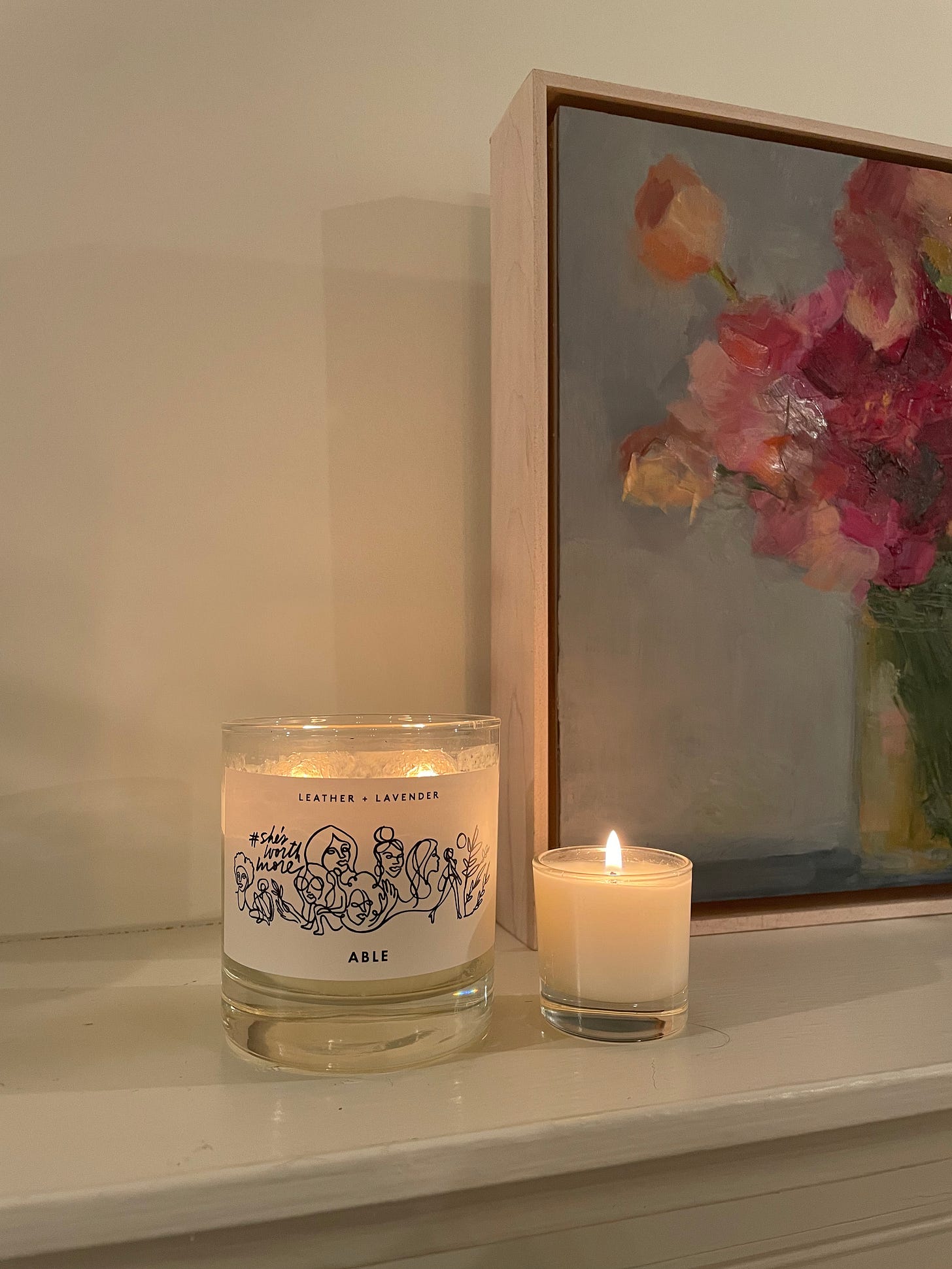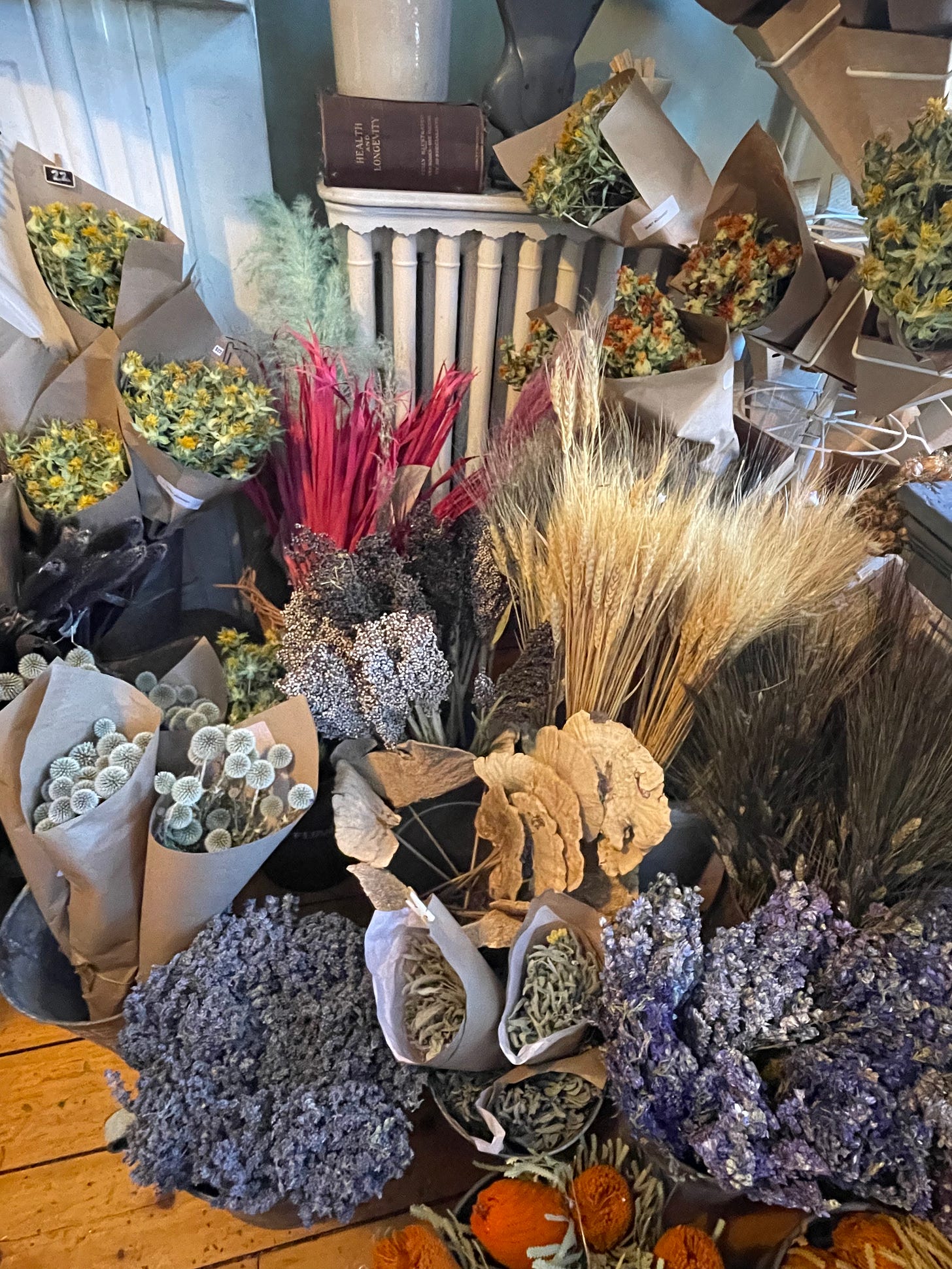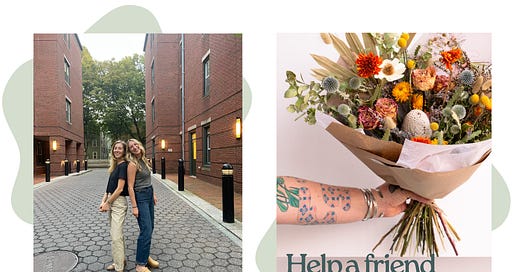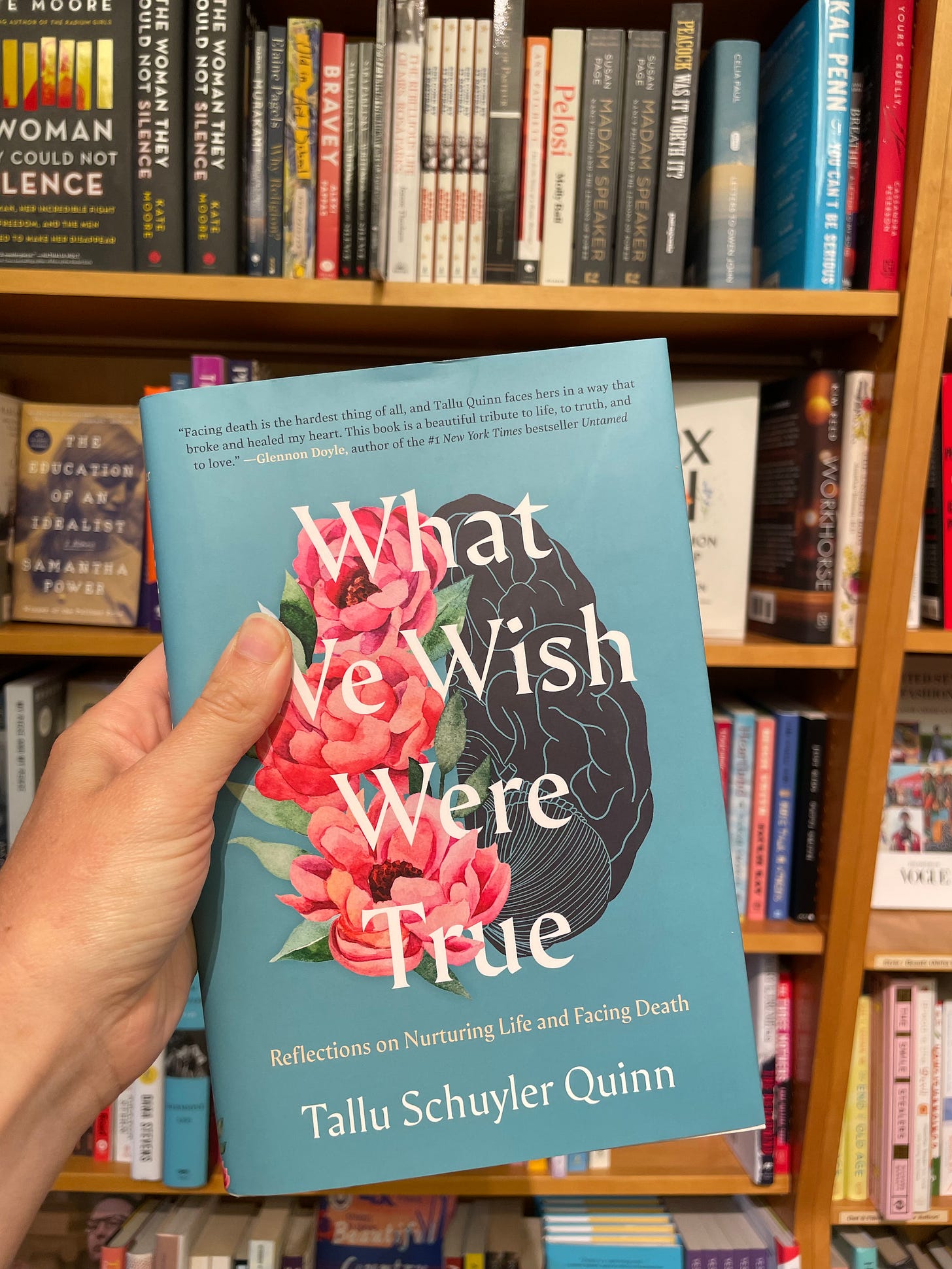Hi, friends! A reminder that this will be the last Platonic Love issue of 2023. Aja and I are taking a short pause over the holidays to rest, recharge, and plan for next year.
But first, we’re really proud to share today’s issue…
Written by . Edited by .
Nearly two years ago, my best friend Margie lost her sister-in-law — an exceedingly special person in many of our lives — to glioblastoma. I’m proud of some of the ways I showed up during that time (flying home for Tallu’s funeral, calling regularly and organizing friends to check in) — yet there are other moments and conversations where I fell short — and when I remember them now, leave me sad or embarrassed.
I’d never faced a loss like Margie’s before — I still haven’t — and without personal experience to guide me, I’ve had to rely on trial and error. There have been times when a friend experienced a loss, or a devastating diagnosis, and I was terrified: terrified of saying the wrong thing, or not saying the right one, terrified of letting them down.
Since then, I’ve learned a lot about supporting a friend through an intense, trying, or traumatic time — and also, how grief can be particularly pronounced during the holiday season.
Aja and I have also gathered tips from Platonic Love readers and friends for this issue. Together, we hope to give you the guide we’ve always wanted to have, one we can refer back to when we’re trying to show up better for our friends.
1. “Walk to a wedding, run to a funeral.”
It's easy — instinctual, even — to run quickly towards joy. It's much harder to sprint towards someone's suffering. But that's exactly when our friends need us the most.
This saying — which was shared by our friend Diana, who lost her brother when she was younger — is a powerful reminder to get there quickly, even if you feel scared, awkward, or unsure.

2. Listen and validate — don’t try to solve.
This was, by far, the most consistent recommendation we heard.
, a full-time writer, mom, and founder of the popular Substack , says, “Don’t minimize your friend’s feelings or give unsolicited advice. When someone close to me is struggling, my first impulse is to locate a solution to their problem: something I can do or say to make it go away as quickly as possible.”She explains, “This is both for my sake and theirs: it’s excruciating to witness someone you love in pain.”
It's easy — instinctual, even — to run quickly towards joy. It's much harder to sprint towards someone's suffering. But that's exactly when our friends need us the most.
But Amelia shares a powerful example of why listening versus solving is so important:
“One of the most difficult times of my life was the four-year period between my daughter’s complicated birth, which left me infertile, and the adoption of my son. When well-meaning friends and acquaintances offered happy-ever-after stories about their pregnancy struggles and reassured me that I was lucky to have one child, I felt intensely lonely. Aside from my doctors and husband, no one understood what was going on inside my body and I did not have the words to explain that I loved my daughter, and I was grieving the loss of my fertility and the future children I had imagined bearing.
writes the newsletter . She shared similar wisdom: “The writer recently posted, ‘All unsolicited advice is criticism.’ That hit hard for me. When a friend is struggling, I like to think I’m being action or solutions-oriented, but they just need to feel seen and heard and comforted.”I most appreciated the friends who listened as I talked about my feelings, without offering hopeful solutions or advice. Simple words, like: ‘This just sucks. I wish I could make it go away. I'm here for you’ were the things I most needed to hear.”
That translates to sentiments like, “‘I'm so sorry you're going through this, I know how hard it must be,’ versus ‘It'll be OK/it's not so bad/look on the bright side,’” Mikala explains.
3. You’re close enough.
At times, I’ve found myself falling into an “Are we even close enough to… go to their mother’s funeral / send a note / bring over a meal?” trap. If you’re asking this question, the answer is almost definitely yes — you’re “close enough.”
I’ve never regretted showing up for or reaching out to someone, as awkward as it may have felt in the moment. It’s the times I did nothing that I wish I could do over. As much as your friend may be surrounded by people showing up for them (many technically “closer” friends), your presence matters.
I’ve never regretted showing up for someone, as awkward as it may have felt in the moment. It’s the times I did nothing that I wish I could do over.
“I still remember every friend who reached out to me when Tallu was diagnosed,” Margie says. “I also remember the friends who didn’t — and I know it was not intentional, but it’s hard to move past that.”
4. Check in (and keep checking in.)
When asked how friends can best show up in these moments, our friend, Lacey, had a simple response: “Occasional calls or texts,” she says.
Another reader, Julia, lost her mom when she was 28. She’d want to hear: “No need to respond but thinking of you.” Julia says. “No need to respond” relieves the pressure while reminding them you’re here.

Aja offers another tip: Set a reminder for specific dates that might be tough (the anniversary of the day they lost someone, certain holidays, etc.) so you can send a loving note or give them a call. These moments, long after the initial loss — and when the rush to surround the person having a tough time has passed — are often when your friend needs to hear from you the most.
As
wrote in a recent article for the newsletter : “After you think it’s necessary might be exactly the right time.”5. Make spending time together easy.
Your friend might be struggling, but that doesn’t mean there’s no space for joy. “Plan fun things your friend can join without any work or expectations on their end,” says my friend Marie, a mom of two who lost her dad shortly after her first child’s birth.
That might look like swinging by their place with the ingredients for an ice cream sundae, asking if they want to take a long walk in their neighborhood, or doing all the legwork for a night out (dinner reservations, movie tickets, etc.) — really, anything your friend will enjoy that you can plan without their input or help.
And, as Kimia Daraghi explains, don’t be afraid to “be casual or silly.”
“Maintain hilarity, absurdity, and make your friends belly laugh (you ARE funny),” she says. “You’ll feel like yourself; your friend in need will feel like themselves.”
Several months ago, Aja and I talked about how a similar mindset could be applied when your friend has a baby — a joyful experience that also, beneath the surface, can carry with it traces of grief, depression, fear, and all of the above:
“Once you had Jude, I just assumed you weren’t going to be around to do stuff anymore. I didn’t want to put any pressure on you — I’d heard so much about how draining and heads-down that time after birth is — so for three or four months, I didn’t initiate much,” Aja says.
But in retrospect, that was the wrong — albeit completely understandable! — instinct. She continued, “You kept inviting me to hang out, and over time, I realized, Wait. You're showing me you have the energy for this. I don’t have to worry about you. I should ask you to hang out, and if it doesn’t work, you’ll let me know.”
5. Make assumptions (yes, really!)
Aja and I have both, at various points, asked friends dealing with tough times, “What do you need?” Although well-intentioned, this question puts the onus back on the friend to figure out how you can help — rather than making their life a little easier.
There are classics for a reason: a home-cooked meal, restaurant gift card, or batch of cookies.
“After Tallu’s death, a group of friends sent me a Postmates gift card. I didn’t realize it at the time, but there was no way I was going to be able to cook for myself,” Margie says. “That small gift felt like such an act of reassurance, an ‘I got you.’”
I’ll always remember when my friend Justine (who had a 9-month-old at the time!) showed up shortly after Jude’s birth with several Tupperware containers of baked pasta shells. And, because much of the focus around childbirth falls on the child, my friend Suzanne showed up with a “gift bag for mom” — magazines, a heating pad, Liquid I.V. packets, and more.
“Sometimes, during a challenging experience, your friend’s fridge will be barren; other times, it’ll be bursting with food from other well-meaning friends,” Maddie said. “Bring dinner anyway. Buy flowers anyway. Finding the perfect way to help isn’t the point.”
6. Talk about the elephant.
It will be almost two years this February since Tallu died. One moment that stands out — and now lives immortalized in a photo on Margie’s fridge — was when a group of women, women who loved Margie, gathered at her house after the funeral to eat Indian food and talk — and cry — about Tallu.
This moment always makes me think: What do we lose when we shy away from saying someone’s name? Of naming the thing?
“I want my friends to address it,” my cousin, Lily, says. “No need to dance around the topic.”
That might mean that you sometimes say the wrong thing — but that’s okay. (Seriously.)
“As I navigated death, divorce, and a layoff, the people who always knew the right thing to do and say were — you guessed it! — people who’d been through the exact same things,” Maddie writes. “That said, it was equally touching to hear from people who didn’t know what to do, but tried their best anyway.”
Further Reading
If you’re interested in further reading, we’ve started a list for you…
Tallu Schuyler Quinn was the founder of the Nashville Food Project, an organization that seeks to bring people together around nourishing food. Her husband, Robbie, shared in his liturgy: “Two days before a surgeon removed as much tumor as possible, [Tallu] let go of her job completely and instead began dedicating her time to documenting and unpacking the sorrow and the joy of this trying time.” The result is a powerful book of essays, What We Wish Were True: Reflections on Nurturing Life and Facing Death, in which Tallu beautifully and achingly grapples with finding meaning on the precipice of death.
I love this essay by challenging the “Five Stages of Grief” with Mari’s own raw, honest look at the sounds of her grief. She begins with a simple premise: “Words don’t make much sense during grief, which is why the question ‘How are you?’ is impossible to answer,” she writes. “The true answer to ‘How are you?’ from a grieving person can’t be answered in words, but in a sound: a cry, a wail, a sigh, a howl, a scream, a moan, a whimper.”
Friend and writer of the newsletter , tackles not just how to give help during tough times — something she learned after the loss of her mother — but the difficult task of asking for help in this poignant response to a reader question (that we’ve also quoted above!)
In this week’s ParentData podcast, Emily Oster interviews author Marisa Renee Lee, expert in coping with grief and the author of the book Grief is Love (which might be the most beautiful title ever?), about the impossible task of parenting through grief.
Please share other resources you’ve found helpful — as well as your advice on showing up for friends, especially during the holidays — in the comments.
Before you go…
We wanted to say a huge “THANK YOU!” before we close our laptops for a few days. We started Platonic Love in May 2023 with exactly zero subscribers. There are now thousands of you!
This past week, we refreshed our About page. It’s about 200 words shorter than our previous version and, we hope, speaks more directly to who we are. If you’re not a Paid subscriber already, we’re now offering 20% off Platonic Love annual subscriptions through the end of the year — so get ‘em while they’re hot! 🔥🔥
If you’re enjoying the newsletter, there are a number of ways to show your support: “like” this post, leave a comment, share Platonic Love with your friends, and/or consider upgrading to a paid subscription. Thank you for being here!













Love this post: I read a poem by Elizabeth Edwards at my 24 yo son’s memorial: “If you know someone who has lost a child and YOU’RE afraid to mention them because YOU think you might make them sad my reminding them that they died, THEY didn’t forget that they died. You’re not reminding them. What you’re reminding them of is that you REMEMBER that they LIVED, and that’s a great, great gift!”
this is so beautiful and heartening as someone whose experience of grief was quite lonely and isolating - to see the community care involved and encouraged is so encouraging 🩷